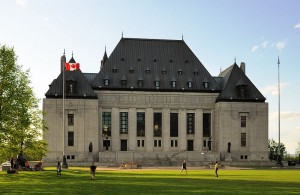 OTTAWA, Ontario — Concerns are growing as the Canadian Supreme Court is set to rule on the country’s current assisted suicide ban, which provides criminal penalties for those who take part in ending the life of another.
OTTAWA, Ontario — Concerns are growing as the Canadian Supreme Court is set to rule on the country’s current assisted suicide ban, which provides criminal penalties for those who take part in ending the life of another.
“Every one who … aids or abets a person to commit suicide, whether suicide ensues or not, is guilty of an indictable offence and liable to imprisonment for a term not exceeding fourteen years,” the Criminal Code of Canada reads.
The court is considering an appeal of a ruling from the British Columbia Court of Appeals, which overturned a lower court ruling allowing the practice of euthanasia. Gloria Taylor, a woman who suffered from ALS and has since died from an infection, was a co-complainant in the suit, asserting that laws against assisted suicide violated her rights, and were discriminatory toward those who were disabled.
The Canadian Supreme Court is to rule on whether the Criminal Code of Canada applies to physician assisted suicide.
“[I]t may be speculated—although there are insufficient data to conclusively confirm this suspicion—that parliament was influenced in its considerations by the essentially religiously-based convictions of many members who, on the basis of their Judaeo-Christian and Moslem beliefs, saw suicide and assisted suicide as a violation of the injunctions of a supreme deity,” University of Victoria bioethicist Eike-Henner W. Kluge wrote in a proposal on the matter.
Last month, two Canadian senators introduced a bill that will remove criminal penalties for doctors who help end a patient’s life. Sens. Nancy Ruth and Larry Campbell are moving forward with legislation originally spearheaded by MP Stephen Fletcher, who is a paraplegic. The College of Physicians and Surgeons of Ontario (CPSO) has also crafted a policy that would require physicians to make referrals regardless of their personal convictions.
Some state that they do not trust the court to come to the moral conclusion and are concerned about what could take place should physician assisted suicide be upheld.
“If the Supreme Court strikes down our laws against assisted suicide/euthanasia, then it will be up to parliament to come up with a new law,” said MP Maurice Vellacott. “If the Supreme Court of Canada strikes down Canada’s current laws on euthanasia or assisted suicide, then CPSO’s policy would mean Ontario’s physicians would have a ‘duty to refer’ patients for treatments intended to kill the patient.”
Writer and attorney Albertos Polizogopoulos said that the implications could reach even further.
“[A]s a result of a discussion with a fellow religious freedom lawyer, I realized that decriminalization will impact the religious freedom and conscience rights of many others,” he said. “Of course, this includes all others in the health care field such as nurses, hospital staff and those working in the fields of psychology and counseling.”
“Lawyers who prepare wills and practice estate planning may be faced with scenarios where their clients ask them to prepare documents which conflict with their religious or moral beliefs,” Polizogopoulos continued. “With the decriminalization of assisted suicide however, lawyers may have clients request the inclusion of language which would ask that they be euthanized in certain particular circumstances.”
He expressed concern over whether rights of conscience will be protected in such instances.
“If and when this type of scenario occurs, will the lawyer be permitted to opt-out from engaging in these kinds of activities? Will the lawyer be disciplined by his or her regulatory body?”Polizogopoulos asked. “Only time will tell, but it is an issue Christian lawyers need to consider.”
CPSO told reporters on Saturday that they believe a ruling could be coming soon.
“[I]f in fact the decision of the Supreme Court is [that] the legislation is struck down, we may have to be prepared to move reasonably quickly to provide some guidance to our members,” associate registrar Bryan Salte told the Leader Post. “Maybe we don’t have a role; maybe we have a huge role. We have to react to whatever the Supreme Court says.”
Become a Christian News Network Supporter...


